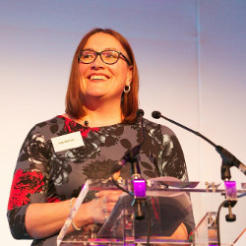Sector leaders need to “step up” and “stop procrastinating” about changes that need to be made in the voluntary sector, Girlguiding chief executive Julie Bentley said yesterday.
Speaking at NCVO’s annual conference, Bentley said the sector has been “really struggling to deal with an increasingly negative environment and public scrutiny”.
“We have responded with anger towards the government, media, Charity Commission and also towards each other,” she said.
Bentley said charities are increasingly viewing each other as competition, with small charities angry with larger charities for taking up contracts and funding - and larger charities angry with smaller charities for “going for pots of money and salami slicing those pots”.
But Bentley said it was important for sector leaders to “step up together”.
“Let’s really take a long hard look at our sector. What’s wrong, what does need to change and how collectively can we lead that change to ensure that our sector is fit for purpose for future generations of beneficiaries?
“We need to stop procrastinating. It is fair that we are under scrutiny because we need to be accountable. So as leaders, we need to lead a change in the delivery and accountability of charities.”
Bentley also called for charities to learn from examples of poor governance highlighted by the media, “to reflect on how we can do things differently and improve”.
Outdated public perception
But Bentley said the sector faces a crisis of perception by a public that misunderstands the role of modern charity in today’s society.
“Much of public perception is based on outdated views of charity – about what we do and how we deliver it. People are not understanding that many of the services that they use are delivered by charities. They are not understanding that many charities are complex organisations that require high-calibre, professional leadership – which warrants people being renumerated appropriately,” she said.
Bentley also called into question public criticism of fundraising practices.
“Fundraising is under scrutiny but many of the public don’t understand how much out fundraising is supporting public services. Some charities rely almost solely on fundraising and are delivering really critical public services with little or no money from the public purse,” she said.
“Charity has changed enormously in recent years but the public understanding of that hasn’t caught up. There is much more to charity these days than the public understands. We deliver complicated public service models, supporting people with complex and multiple needs. We have increased competition from the public sector, and there is increased demand for accountability compliance and we are bound with more legislation than previously. We are required to demonstrate our impact – and rightly so – but this takes resources."
Bentley urged charities to put the needs of beneficiaries before the needs of any individual charity or its staff.
“Any charity that thinks it’s important to hang onto beneficiaries is wrong. We are here to deliver services as best we can, to someone who needs and wants them. If someone else can deliver those services better, in a way that a person finds easier to access, then we should be embracing that,” she said.
In particular, she urged small, struggling charities to embrace partnerships and mergers.
“It’s much more fun playing with friends that going it alone,” she said.










